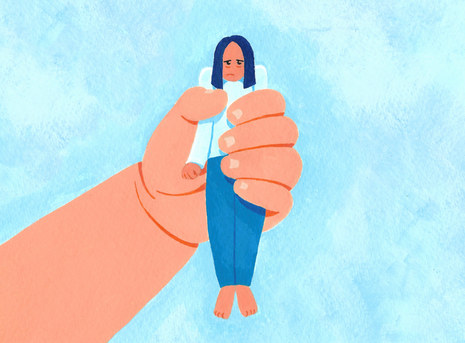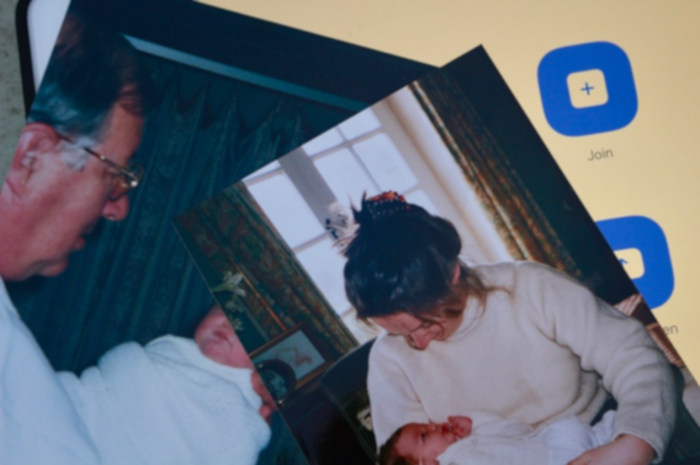Why I will never have children
Oxana Zhigalova writes on parenthood and her wish to not be constantly questioned about her choice to not have kids

‘Mommy, I need you to wipe my bottom!’ was the first thing I heard coming back home from a library. Thankfully, I was not the child’s mother and did not have the joy of satisfying his pressing need; I was simply living with a host family who happened to have three children. The children were four, five and seven years old and, needless to say, the house was filled with screams, fights and the desperate mother either running around or having her daily glass of vodka.
The mother of the family was repeatedly telling me that the experience of living with them would be ‘mental contraception’ for my future, without missing the opportunity to ask whether an international student like me knew what the word ‘contraception’ meant. Regardless, it was quite amazing to see a stay-at-home mother of three who was actively encouraging me to go childfree.
Perhaps even more surprising was the fact that she was a mother in the first place. Before devoting herself to family life, the woman had a successful career at the UK government after getting her Master’s from Oxford. She was dynamic, confident and self-sufficient, yet she chose to sacrifice her promising career to spend the next twenty years at home with children, being left with, in my view, not much at the end of the process but good memories.
It might be said that my portrayal of parenthood is unfair. The supporters of the view that children are ‘the greatest treasure of life’ often claim that the experience of having and raising children is immensely rewarding and can be compared to nothing else in life.
Well, not necessarily…
"At no point in my short life have I had an incentive to have children."
At no point in my short life have I had an incentive to have children. For a year I was dating someone who had similar views on the issue but who (unbelievably) was also a father of two. In his case, perhaps unfortunately, the unwillingness to be a parent did not disappear upon having children. Fortunately though, for his children, he loved and took good care of them but there was a bitter regret, on his behalf, about the turn that his life had taken after having kids. Being a weekend dad, he would drive to London to collect his children for a night or two while having an awkward and unwelcome encounter with his ex-wife. The fact that he had left his much-loved job to construct a family and had pretty dim financial prospects thanks to his children’s private school fees did not help the situation.
Throughout the year of our relationship, I witnessed all the damage that parenthood brought to his life. I also realised that in our gender-structured world, if I were ever to have children and regret it, I would not be able to reduce the contact with them to weekends. I would be forced to care for these children or leave them with nannies, only to be blamed later for the lack of attention I was giving them. The prospect is real and frightening and confirmed the conviction that having children is simply not an option for me.
My decision to never have children was not formed only through observation of people I knew in the UK, as it was primarily influenced by growing up in Russia where having children is a must, especially for women. I was forever questioning this social norm, particularly due to my mother’s and her friends’ experience of having children; yet, I was constantly reminded of the expectation of women to have children in Russia. This was reinforced to me when I would walk down the street smoking, as complete strangers would regularly shout at me ‘stop smoking, you will have children to give birth to’.
Reflecting on the things that I wanted to get out of my life, I understood that it was not sitting at home surrounded by children’s books and toys. It was not being sleep-deprived and exhausted by the demands of childcare. Instead, I wanted to be educated, independent, and have a challenging and rewarding job. It is not impossible to combine these values and goals with child rearing. However, a demanding career often involves a requirement to work long hours which I would not be able to satisfy without having someone at home to take care of the children. But then what would be the point of having children if I would hardly ever see them?
"And then there is fear..."
And then there is fear. What if this child of mine grew up to despise or hate me? Or if they inherited some disease I had that made me ashamed to go out of the house? What if they became murderers? I knew that that, at least partly, would be my fault and I am simply not ready to take on this responsibility. Given that I can hardly take care of my own life, how can I teach other human beings to take care of themselves?
Ultimately, having children is a personal choice and I wish it would be taken as such. I wish it weren’t the case that whenever I go back to Russia I am asked when I will get married and have little ones. I wish that whenever I said I will not do either my answer did not invariably receive the categorical retort, ‘You will’. While I might not be able to change social expectations, I can act in accordance with my own decisions, one of which is to never have children.
 News / Caius mourns its tree-mendous loss23 December 2025
News / Caius mourns its tree-mendous loss23 December 2025 News / Cambridge welcomes UK rejoining the Erasmus scheme20 December 2025
News / Cambridge welcomes UK rejoining the Erasmus scheme20 December 2025 News / CUP announces funding scheme for under-represented academics19 December 2025
News / CUP announces funding scheme for under-represented academics19 December 2025 News / King appoints Peterhouse chaplain to Westminster Abbey22 December 2025
News / King appoints Peterhouse chaplain to Westminster Abbey22 December 2025 Interviews / Politics, your own way: Tilly Middlehurst on speaking out21 December 2025
Interviews / Politics, your own way: Tilly Middlehurst on speaking out21 December 2025








